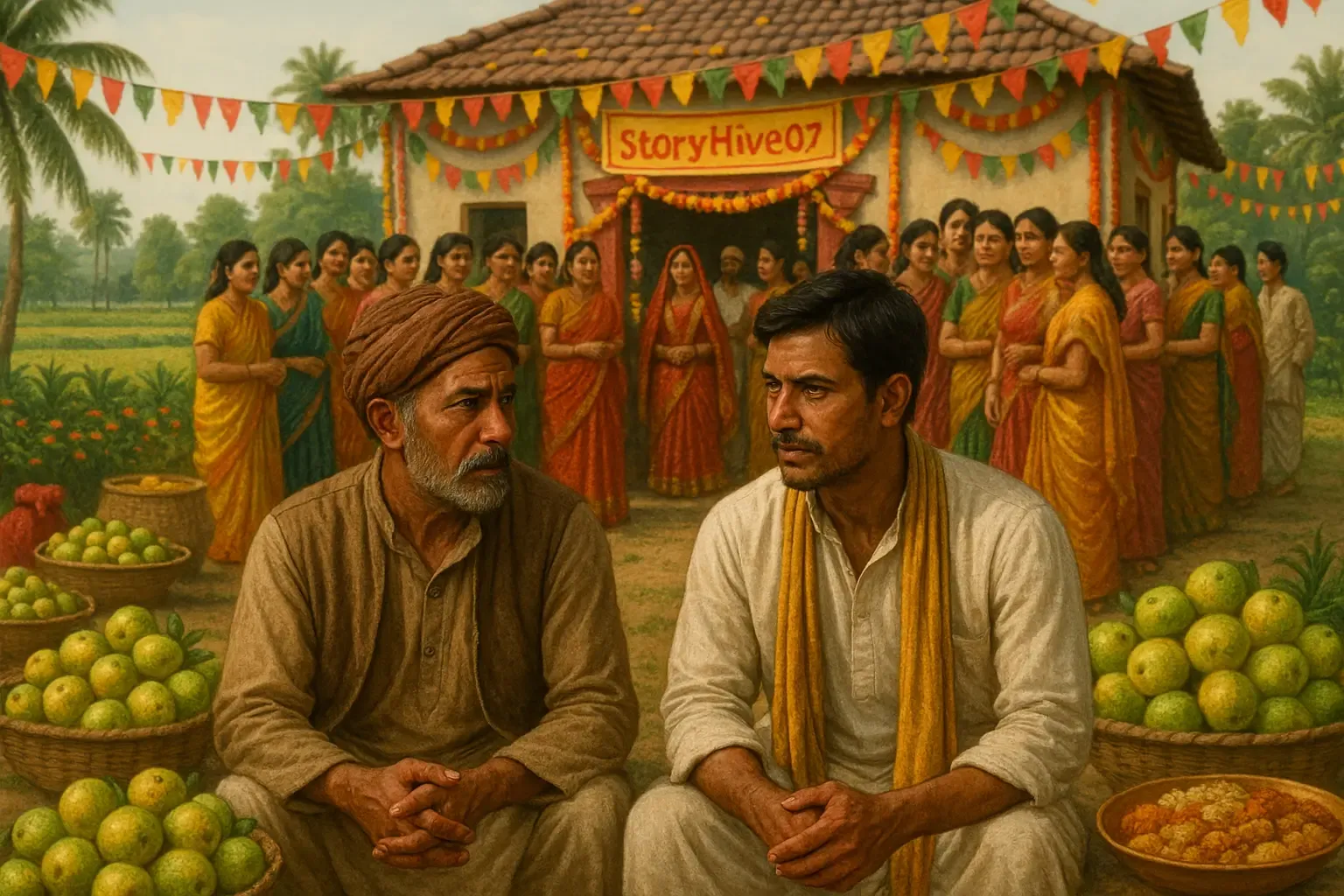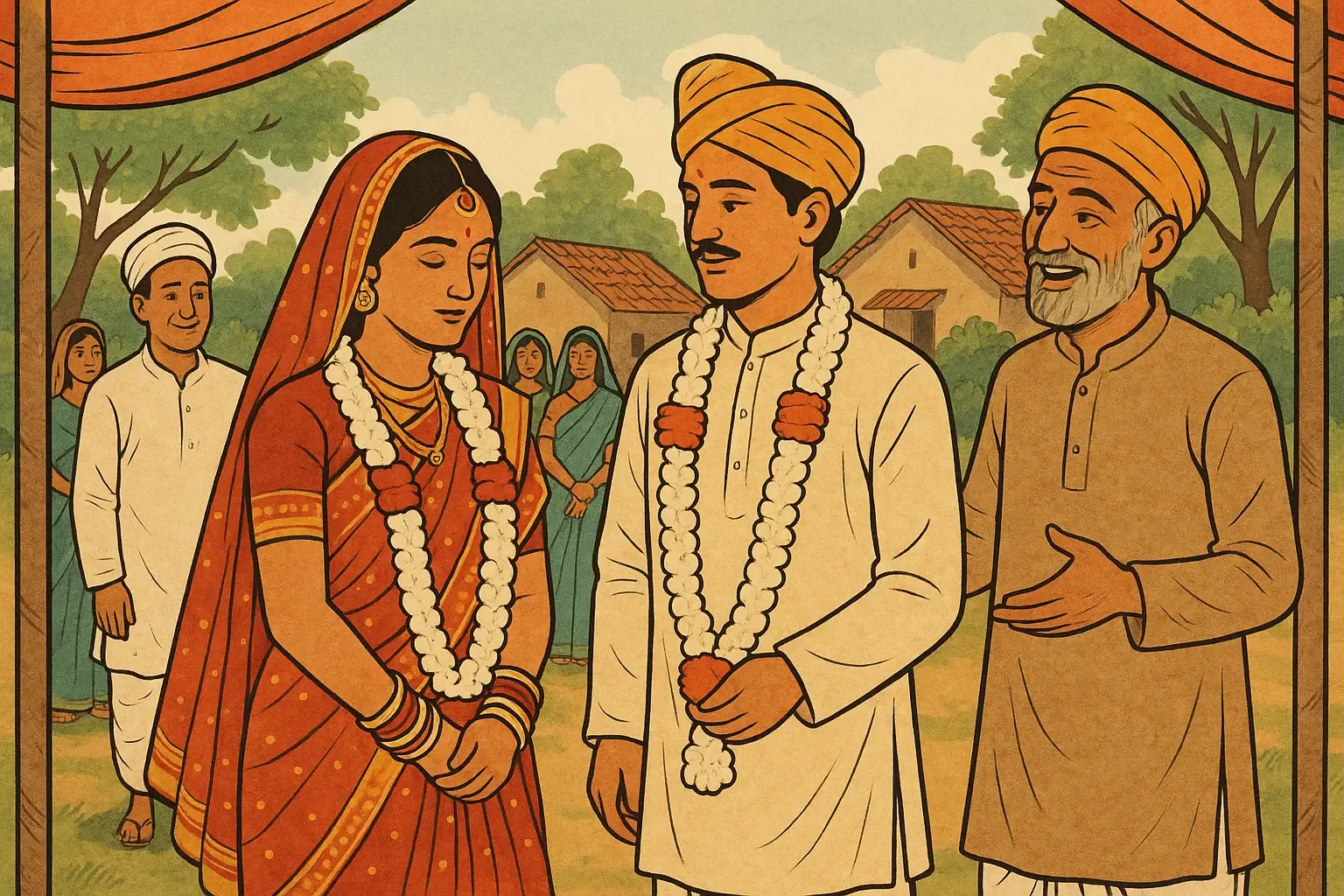Friend Bevar
A Tale of Friendship, Pride, and a Bold Stand Against Dowry
By StoryHive07
Two Friends, Two Paths: Shandhapur and Bishnupur
Shandhapur’s Nalu Das and Bishnupur’s Govinda Paital were lifelong friends, bonded through years of companionship. Das had three sons and three daughters, while Paital had only one child—his beloved son Nandakishore.
Before Nandakishore even reached marriageable age, Das successfully married off all six of his children. With this responsibility fulfilled, Das went to visit Paital, bringing traditional gifts—guava and Mahaprasad. In return, Paital too visited Das, but always with humility, carrying the weight of their friendship on his shoulders.
As Paital often said:
“All is well. If it’s too great, it may not be good.”
Nanda's Search for a Bride
When Nandakishore came of age, he spent an entire year traveling, seeking a suitable bride. Despite all efforts, none impressed him or matched Paital’s ideals. His father had only one wish: to bring a daughter-in-law home—not for money or status, but for love and family.
Paital valued even the tiniest possession of their household.
If a piece of camphor fell from the shrine, it was preserved with care.
He gave his son five acres of land and a writing slate to start life independently. Nanda, now educated, had become self-reliant.
Despite Paital’s modesty, many came forward to offer their daughters in marriage, lured by Nanda’s prospects. These suitors offered dowries—gold, furniture, utensils, bicycles—but Paital rejected them all.
“What kind of friend asks for dowry while pretending to be a friend of seven? We are happy with our conch shell and vermilion.”
Dowry: A Social Curse
Some people even tried to manipulate Nanda through his friends. His father was mocked for being a Maratha, and Nanda's material assets were paraded like trophies: Jaipuri gold ornaments, Humber bicycles, pilot watches, and teakwood furniture.
But Nanda stood firm:
“No one becomes a good human being with dowry. These are the ways of fools. Dowry is a curse on society. Until it's abolished, peace and happiness will remain out of reach. If we, the youth, don’t oppose it, who will?”
Marriage Fixed, But Egos Clash
Eventually, Nanda’s marriage was fixed in Padhanpada. Meanwhile, news spread that Belpur had bought land near Bishnupur and was flying between the two in airplanes!
The Bishnupur folks said:
“Let him come. If not, our boy will stay here and fast.”
When the marriage day came closer, Paital invited all his friends with guava and Mahaprasad—but Das received his invitation by post, not in person. Deeply insulted, Das stormed to the village magistrate asking:
“Should I still treat Bishnupur’s Paital as a friend?”
Though Das wore a saintly robe and chanted outside, his ego burned inside. He could’ve saved ₹57 if he had stayed silent and controlled his emotions. But as the saying goes, even saints aren’t free from worldly worries.
Chaos on the Wedding Day
The wedding celebrations began. Drummers, musicians, and light decorators filled the village. The responsibility for all arrangements fell on Paital, and he didn’t even have a moment to rest.
Trouble came when Behera, the traditional transport provider, refused to carry the groom from Bishnupur, fearing retaliation from the Belpur side.
Paital didn’t lose composure:
“Let Behera go. How can a wedding stop without a carriage? Here’s ₹300. Pay ₹25 per place and hire taxis.”
A local named Punjai Jordar boldly stepped up:
“Behera won’t come? Let’s see who dares stop us!”
But while arranging taxis, a postman arrived with urgent news—there was a parcel from Nalu Das.
The Shocking Parcel: A Beard and a Penny
Inside the parcel, everyone expected gold or money. But instead, they found:
A bundle of beards
A single penny
And a handwritten letter
The letter read:
“I could not find anything more valuable than this for a friend like you. This beard, which I have kept for years, is worth ₹9900 and 900 pennies. To make it a round ₹1000, I’ve added a penny too. Hope you understand.”
This strange gift stunned the entire gathering. What was supposed to be a gesture of friendship turned into a symbol of sarcasm, ego, and hurt pride.
The beard wasn’t just hair—it was a metaphor for wounded honor.
Conclusion: A Thought-Provoking Tale
This story, though humorous and dramatic, exposes deep social issues:
Friendship vs. Ego
Marriage vs. Dowry
Values vs. Materialism
In the end, “Friend Bevar” isn’t just about two villages or two families. It’s a mirror to society’s flawed customs, a tribute to those who oppose dowry, and a call to preserve relationships over riches.
Why Did Gaura Cry? – A Clever Tale of Mischief and Wisdom
This Gaura, why are you crying?
A little boy. His name is Gaura. Gaura is a little girl to look at, but he is number one in evil. He goes and beats his hands in the cart. Father, mother, teacher, gurujan, he doesn't listen to anyone. Half the day he goes to school and half the day he hides on the way. From whose stick does he steal the pijuli, from whose stick does he pick the karamanga and eat it. Sometimes he climbs a tree and breaks the nest of a mouse, sometimes he chases after a monkey.








0 Comments